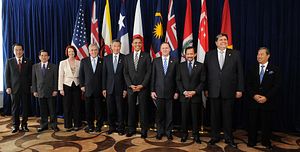On October 5, most Chinese were still enjoying their “Golden Week” national holiday. However, at the same time, a huge development occurred halfway across the world that might have a fundamental effect on their lives. This was the announcement that the long-delayed Trans-Pacific Partnership (TPP) deal was finally reached, thanks to heavy pressure fronted by the United States.
This landmark deal could have huge economic, political, and geopolitical consequences. For example, many prominent economists have already decried the deal for giving unfair advantages to big corporations. The most interesting implication, however, is how this landmark deal could affect U.S.-China relations.
Indeed, as U.S. President Barack Obama has said before, the TPP deal is meant to demonstrate that the United States, not China, should write the rules for global trade. Many also see the TPP deal as a centerpiece of America’s “pivot to Asia” strategy, aimed at pressuring China. Whatever the main purpose of the TPP, most Chinese analysts view it as a containment strategy directed at Beijing, trying to exclude China from the global trade network and hurt its economy.
The key question is this: how much of a negative impact will the TPP deal really have on China? This is the subject of an ongoing fierce debate in the country. Some pessimists maintain that the TPP deal is a victory for the U.S. and Japan, the two most likely rivals to China’s rise. They worry that China could be cut off from important aspects of the booming global trade networks, thus seriously hurting China’s export-dependent economy. An extreme, feared scenario resulting from the TPP could be the catalyst for an economic crisis, following a huge decline in China’s international trade.
Unlike the World Trade Organization rules, the TPP contains clauses for very high standards with regard to labor laws, the environment, regulation of the free market, privatization, and freedom of information requirements. This, according to some, makes it impossible for China to compete with other economies, at least in the short run. Since it is unlikely that China will reform its system fundamentally in the near future, the country will lose its trade advantages and overall national competiveness against the United States.
However, there are other, more optimistic takes on the TPP in China. These claim that the TPP is not a big deal for several reasons. First, they argue that the TPP will face strong domestic opposition in the U.S. when it is forwarded to Congress. Even if Congress approves the deal in the end (which is very likely), the final implementation stage could be very costly for the United States.
A good previous example is the Kyoto Protocol. It is possible that a future U.S. administration might just reject the TPP deal, especially if a Republican wins the presidential election. Given the high level of economic interdependence between major economies, it is unwise to exclude China, the second largest economy in the world, from global trade. In other words, the U.S. might be able to use the TPP to hurt China’s economy, but the U.S. itself will be hurt as well. Some believe that the pressure brought by the TPP might even facilitate China’s domestic reforms, just like the WTO deal was used by the Chinese government to open up its economic system. According to optimists, it is a good thing that the TPP has high standards for labor and environmental protection, issues that China needs to take seriously.
To conclude, it is still far too early to declare a victory for the U.S. and Japan against China on the TPP. It is also unwise to emphasize the geostrategic competition aspect of the TPP deal. For China, this is a golden opportunity to reform its economic system by letting the market play a pivotal role.
This might be easier said than done. But China has no other choice; reform is the only way forward.
































